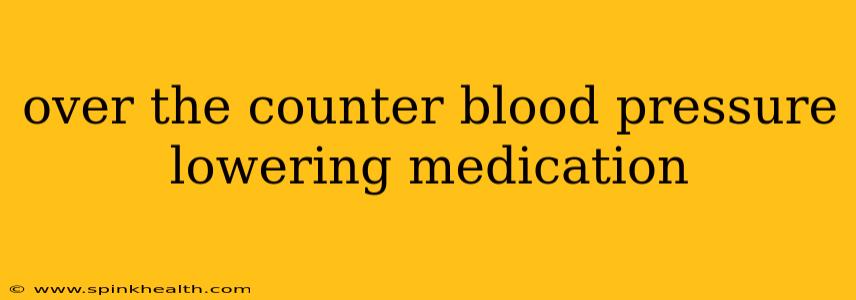High blood pressure, or hypertension, silently affects millions, often without noticeable symptoms. It's a significant risk factor for heart disease, stroke, and kidney failure, making it crucial to manage effectively. While prescription medication is often necessary, many are exploring ways to lower their blood pressure naturally, or at least supplement their prescribed treatment with lifestyle changes and over-the-counter (OTC) remedies. Let's embark on a journey to understand the options available and how to approach this vital aspect of health responsibly.
This isn't a replacement for medical advice; always consult your doctor before making any changes to your medication or health regimen. This exploration of OTC blood pressure-lowering options serves as an informative guide, empowering you to have a more informed conversation with your healthcare provider.
What Over-the-Counter Medications Can Help Lower Blood Pressure?
The truth is, there aren't any OTC medications specifically designed to directly lower blood pressure in the same way prescription drugs do. Prescription medications such as ACE inhibitors, beta-blockers, and diuretics target specific mechanisms within the body to control blood pressure. However, several OTC options can indirectly contribute to lower blood pressure by addressing underlying factors.
Can Certain OTC Pain Relievers Help?
Some studies suggest a potential link between regular use of certain NSAIDs (Nonsteroidal Anti-inflammatory Drugs) like ibuprofen and a slight increase in blood pressure. This isn't a definitive cause-and-effect relationship, and more research is needed. However, if you have high blood pressure, it's wise to discuss your pain reliever use with your doctor. They can help you find the safest approach for managing pain while considering your blood pressure.
What About Supplements?
The supplement market offers a wide array of products claiming to lower blood pressure. However, it's crucial to approach these with caution. Many lack robust scientific backing, and their efficacy can vary greatly. Some supplements that might offer some support (always consult your doctor before use) include:
- CoQ10: This antioxidant plays a role in heart health, and some studies suggest it may have a modest blood pressure-lowering effect.
- Magnesium: Magnesium is crucial for numerous bodily functions, including blood pressure regulation. A magnesium deficiency can contribute to hypertension. However, supplementation should only occur under a doctor's supervision.
Remember: Supplements are not regulated by the FDA in the same way as medications, so their purity and effectiveness aren't always guaranteed.
Beyond OTCs: Lifestyle Changes for Lowering Blood Pressure
The most effective and sustainable approach to managing high blood pressure involves lifestyle modifications. These changes are often recommended alongside, or even instead of, medication, depending on the severity of the condition.
What Lifestyle Changes Can Lower Blood Pressure?
Several lifestyle choices can significantly influence your blood pressure:
- Diet: A diet rich in fruits, vegetables, whole grains, and lean proteins, low in sodium, saturated fats, and processed foods is vital. The DASH (Dietary Approaches to Stop Hypertension) diet is a well-researched example.
- Exercise: Regular physical activity, aiming for at least 150 minutes of moderate-intensity exercise per week, is crucial.
- Weight Management: Maintaining a healthy weight reduces strain on the cardiovascular system.
- Stress Reduction: Chronic stress elevates blood pressure. Techniques like yoga, meditation, or deep breathing can be beneficial.
- Alcohol Consumption: Limiting alcohol intake is crucial, as excessive alcohol consumption raises blood pressure.
- Quit Smoking: Smoking significantly damages blood vessels and increases blood pressure.
Does Potassium Help Lower Blood Pressure?
Yes, potassium plays a vital role in blood pressure regulation. It helps counter the effects of sodium, reducing strain on the cardiovascular system. Potassium-rich foods like bananas, spinach, and sweet potatoes are beneficial. However, excessive potassium intake can be harmful, so it's important to maintain a balanced diet and consult your doctor before increasing potassium intake significantly, especially if you have kidney problems.
What Are the Best Natural Ways to Lower Blood Pressure?
The "best" natural ways are the consistent lifestyle changes mentioned above. There's no single magic bullet. It's the cumulative effect of a healthy diet, regular exercise, stress management, and avoiding harmful habits that makes the biggest difference. These are often the first line of defense before medication is considered.
Conclusion: A Holistic Approach
Managing high blood pressure is a journey, not a sprint. While OTC medications may play a small supporting role, the foundation for effective blood pressure control lies in embracing a healthy lifestyle. Always consult your doctor before starting any new medication or supplement regimen, especially if you already have underlying health conditions. This proactive approach, combined with regular monitoring and medical guidance, will significantly improve your chances of maintaining healthy blood pressure for years to come. Remember, your health is your most valuable asset. Invest in it wisely.

